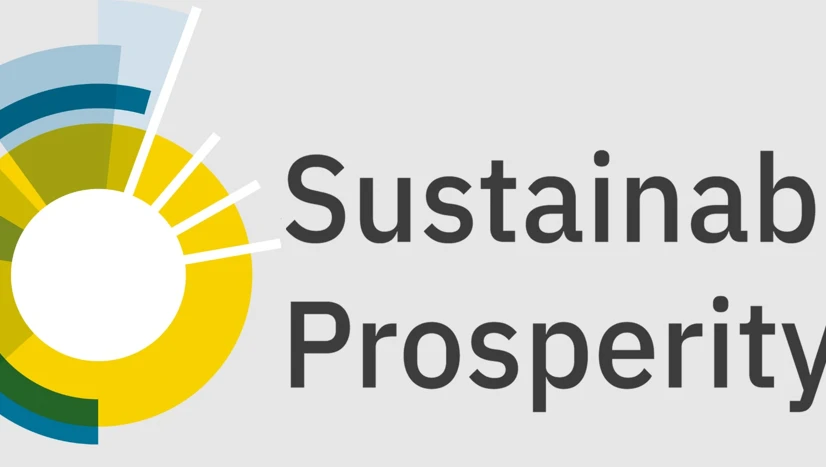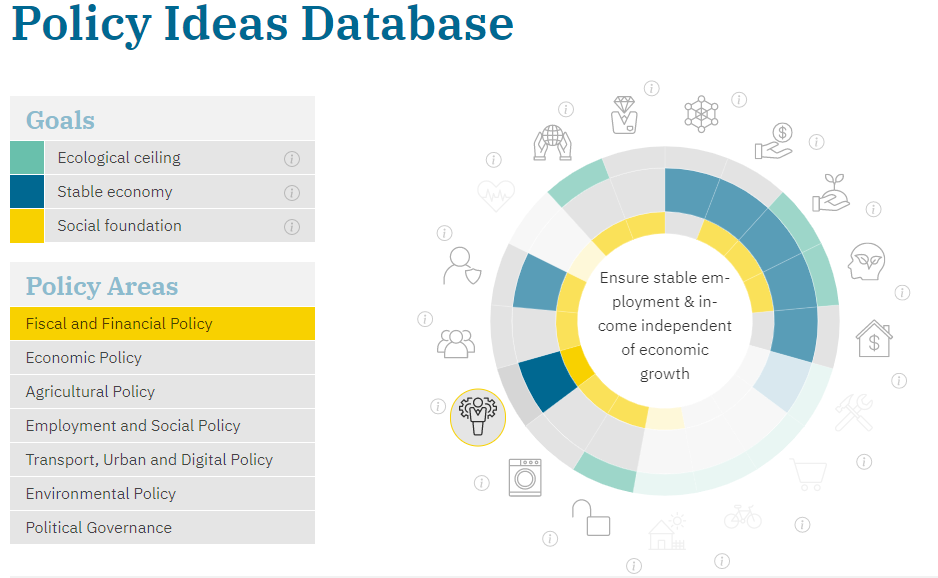Sustainable Prosperity
Sustainable Prosperity
A toolbox to support change makers in public policy institutions.
1. The Project
The purpose of the project Sustainable Prosperity is as easily stated as the task at hand is challenging: facilitating sustainable prosperity in Europe. Currently, economic growth is at the centre of European policy-making. Growth seemingly represents an essential condition for maintaining economic and political stability. It is also the root cause why policy today focuses mainly on efficiency improvements and the circular economy when it comes to tackling climate change.
To achieve sustainable prosperity, it is therefore crucial to liberate economic and political stability from the need of continous economic growth. Only then will it be possible to move beyond economic growth as a policy goal and put environmental and social considerations at the heart of European policy-making. In this sense, the ‘Policy-making Beyond Growth’ project seeks to raise awareness of growth dependencies among decision-makers and offer scientifically informed guidance for political action. By doing so, the project paves the way for sustainable prosperity in Europe.
The ‘Policy-making Beyond Growth’ project comprises several interconnected pillars. In the course of the project phase, co-creative policy labs and workshops with members of EU policy and academia were organised. Based on these, policy objectives, channels and concrete instruments were developed and compiled to address the problem of growth constraints and achieve sustainable prosperity in Europe. Furthermore, a European network of important actors and policymakers was identified to create a productive exchange and to bundle the potential and possibilities for socio-ecological transformation.
This website presents the results and key findings of the project, making them freely available. Most importantly, it provides a comprehensive synthesis of existing growth dependencies as well as an instructive overview on policy instruments to reduce those dependencies.
The website is not a final product, but is intended to stimulate processes and undergo continuous development.
2. What the platform provides
- Policies: To date the platform presents more than 300 policies for sustainable prosperity, clustered around 3 global goals and 17 high-level objectives. We have identified 101 required changes that have to happen to shift towards a sustainable prosperity across 7 policy areas including fiscal and financial policy, environmental policy and employment and social policy.
- Arguments: Policymakers can compare key arguments for and against the necessity of GDP growth to ensure economic and political stability as well as greening the economy. These arguments form the foundation for building knowledge capacities for a sustainable prosperity.
- Narratives: Readers interested in in-depth knowledge can learn why Europe needs a resilient economy and how GDP became the major indicator for economic progress.
3. Goals
3.1 Ensure an economy within ecological boundaries
The natural environment represents the basic foundation of any economic activity as well as life itself. It is thus pivotal to ensure an economic system that operates within ecological boundaries. In this sense, sustainability refers to a pathway of transformation that reconciles the economic system with the environmental capacity of the earth. To safeguard the integrity of the environment, it is imperative to decrease the use of non-renewable resources and overused renewable resources in absolute terms employed as inputs within the economic processes and reduce the ecological impacts of economic activity in the form of waste and emissions. The associated instruments, channels and objectives seek to contribute to the achievement of this goal. In this regard, the speed of the aforementioned reduction is decisive, if ecological targets – such as limiting anthropogenic temperature rise to 1.5°C – are to be achieved. Furthermore, ensuring an economy within ecological boundaries is crucial from an eco-nomic point of view, as the transgression of planetary boundaries is associated with considerable economic costs in the long run and may impair the stability and functionality of complex economic systems. Therefore, the internalisation of environmental costs is pivotal in order to ensure that economic agents can take into account environmental costs in their decision-making.
3.2 Enable economic stability that is independent of growth
The functionality of the economic system depends crucially on its stability. Nowadays, economic stability is achieved primarily through the dynamics of continuous economic growth, as demonstrated by employment and fiscal budgets. As a result, contemporary policymaking faces a pivotal dilemma. On the one hand, we require massive political action to effectively tackle today’s social and environmental challenges. On the other hand, such political action erodes economic growth – which compromises the stability of the economic system itself. This predicament could be avoided by decoupling economic stability from economic growth. We propose a number of policy instruments and proposals to this end. In an economy that does not depend on growth, the political scope of action is significantly broader. This allows policymakers to choose freely among more effective and targeted instruments to achieve policy objectives, without being bound to the one-way highway of economic growth and all its unintended yet inevitable consequences.
3.2 Ensure high levels of subjective and collective wellbeing independent of economic growth
From a socio-economic point of view, the economy serves the purpose of facilitating societal conditions that allow for high levels of subjective and collective well-being. In this context, wellbeing can be understood as the societal ability and capacity to satisfy the basic human needs of each individual, which is consistent with the original meaning of “welfare”. Basic human needs refer mainly to material aspects such as the need for food, water and shelter. However, they also comprise social as well as psychological needs, the satisfaction of which is of utmost significance to well-being in a societal framework. In this sense, ensuring high levels of well-being does not primarily refer to the continuous increase in material or monetary affluence. Therefore, instead of principally focusing on economic growth, economic activity and development must be geared towards the satisfaction of basic human needs to realise high levels of the individual as well as collective well-being. Most importantly, it is imperative to achieve well-being independently of economic growth – i.e. decouple the satisfaction of basic material needs from income – in order to overcome the socially ambivalent implications of growth. The instruments, channels and objectives in this category aim to achieve this goal. Lastly, it must be emphasised that this needs-based understanding of well-being must be reconciled with a merit-based approach to socio-economic fairness in order to enable an economic system oriented towards justice and well-being.
4. Methodology of the Policy Database Framework
4.1 Motivation: The Why
Today’s ecological and socio-economic challenges threaten the long-term stability and resilience of European society. Even though the magnitude of these challenges is broadly acknowledged, political efforts to properly tackle them remain insufficient. To move Europe into the “safe and just space for humanity” (1), innovative policy approaches are required. In fact, these policy approaches must equally address social, ecological and economic goals in a coherent manner and help overcome the primacy of economic growth as a policy goal. However, due to the perception that economic growth is essential to ensuring employment, tackling fiscal debt and achieving higher incomes and levels of well-being, this is easier said than done. Not only does policy have to focus on a wider set of objectives, it also has to liberate economic and political stability from its structural dependency on economic growth. In this way, policymakers are enabled to freely choose among different means to achieve political ends, rather than relying on one specific aspect like economic growth. However, a consistent synthesis of policies seeking to overcome the existing growth imperatives and shape a sustainable and thriving European and global economy is currently missing. Researchers have put forward a multitude of proposals. However, the practical application of these proposals entails several challenges related to the interconnectedness, coherence and concretion of policies as well as their level of implementation by government. This project aims to fill this gap. Our policy framework provides a coherent structure of policy proposals from the academic literature that can help shape sustainable prosperity. In doing so, the project aims to help policymakers comprehend what policy instruments are suitable to promote transformative actions and, in doing so, contribute to political objectives.
4.2 Methods: The How
The work on our policy framework was inspired by existing frameworks used by the United Nations (UN) for environmental (2) and industrial policymaking (3). Our policy framework comprises four interconnected hierarchical levels:
- Goals constitute the highest hierarchical level and denote an overall abstract goal within a sustainable and well-being oriented economy, e.g. “Ensure a stable economy independent of economic growth”
- Objectives represent a tangible specification of goals, e.g. “Ensure stable employment & income independent of economic growth”
- Transformative actions refer to a particular change required to achieve certain objectives, e.g. “Working time reduction”
- Instruments constitute the lowest hierarchical level and refer to a concrete policy aiming to achieve an objective via a transformative action, e.g. “Limiting the maximum amount of working hours per week via regulation”. Instruments can be structured along four categories: incentives/disincentives, regulation, information and ownership.
Using this structure, an unstructured expert-led literature review was initiated to compile policy instruments and develop concrete elements for all hierarchical levels by way of an inductive approach. To date, the literature database includes policy ideas from over 80 sources. This step was complemented by deductive work, whereby new objectives and transformative actions were derived from the existing content and its structure by identifying possible blind spots of the framework. In this sense, the establishment and concretion of the framework structure were not carried out in a strictly linear manner, but rather represented a back-and-forth process with on-going adjustments.
Subsequently, the multi-level structure of our policy framework was specified based on theoretical considerations and expert inputs. In this way, every element of an individual hierarchical level was assigned to one or multiple elements of the superordinate hierarchical levels. This multi-level relation of individual elements across all hierarchical levels is referred to as interlinkages within this framework, providing an intricate structure for the identification of relevant policy instruments. Lastly, transformative actions were structured along a set of policy areas to increase the practicability of our policy framework for policymakers. Currently, the policy database includes 17 objectives, 86 transformative actions and 230 policy instruments along 7 policy areas. This is only a first step. In the future we hope to extend this database, complement policies with best-practices and engage with the academic community to improve the quality and scope of this website.
5. The Institution
ZOE, the Institute for Future-Fit Economies, is an independent think and do tank for new economic thinking and policy-making. Working at the interface of science, politics and civil society, ZOE acts as a catalyst for a just transition towards a sustainable future. We are a team of young and engaged economists. As former members of the international student movement on New Economic Thinking and long-standing advocates for an economy, beyond growth, our mission is to change the direction of European economic policy towards environmental sustainability, justice and well-being. Our work is supported by a pool of excellent research fellows around Europe and distinguished advisory board members, including Kate Raworth (University of Oxford) and Tim Jackson (University of Surrey).
ZOE has successfully informed European debates on the socio-ecological transformation. It has access to a diverse network of progressive public servants, including leaders and high-level representatives of various DGs, such as ECFIN, RTD, GROW, ENV and EMPL. ZOE can build on detailed expert knowledge of EU policy-making and a well-established network of policymakers in the EU.


